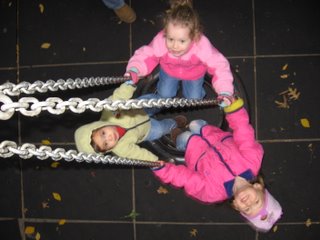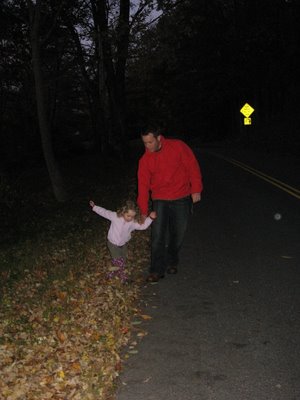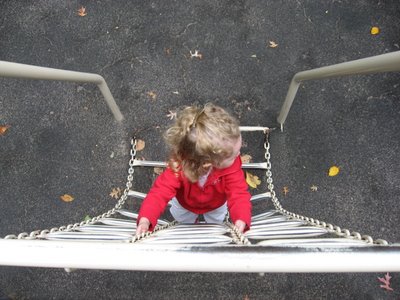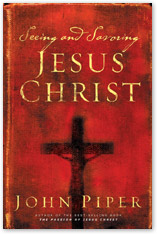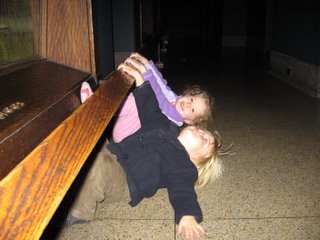Tuesday, October 31, 2006
Roasted Fall Vegetables
We've tried this recipe a couple of times now (and again tonight), and it is delicious and healthy!
Posted by
Graham
at
8:34 PM
0
comments
![]()
Labels: Recipes
You must say
Today Pop-pop came to visit Elisabeth (and to bring her a bicycle that he refurbished after her previous one was stolen). While they were sitting together on the couch reading a book, he asked Elisabeth, "Can I have a hug?" Elisabeth replied,
"You must say: 'May I please have a hug . . . in Spanish!'"Even we don't make her ask in Spanish!
Posted by
Graham
at
5:38 PM
0
comments
![]()
Labels: Elisabethisms
Monday, October 30, 2006
Wearing the kid-pack

Posted by
Graham
at
8:51 AM
0
comments
![]()
Turning the tables
The question with which I am wrestling [...] is this: As people who are part of modern Western culture, with its confidence in the validity of its scientific methods, how can we move from the place where we explain the gospel in terms of our modern scientific worldview to the place where we explain the modern scientific worldview from the point of view of the gospel?
(Weston, Paul. ed. "Lesslie Newbigin: Missionary Theologian." Grand Rapids, MI: Eerdmans. 2006 p199)
That this question is so rarely asked is strong evidence that in many ways our thought, even about proclamation, is shaped far more by our culture than by the gospel. That Newbigin asks it so clearly and forcefully is a good indicator that he was on the pursuit of a truly missionary encounter with Western culture that had the gospel as its foundation - and we would do well to learn from him.
Posted by
Graham
at
8:49 AM
0
comments
![]()
Lilly's Big Day
 In order to learn how to be a flower girl for Aunt Kate's wedding, Elisabeth was given this book. In it Lilly is obsessed with being a flower girl for her teacher's wedding.
In order to learn how to be a flower girl for Aunt Kate's wedding, Elisabeth was given this book. In it Lilly is obsessed with being a flower girl for her teacher's wedding.
In characteristic form, Henkes does a brilliant job of highlighting Lilly's childlike qualities, and her parents' characteristic responses. Lilly is truly delightful.
Although in some of his books, I feel like the end falls a bit flat (even though the characters are rich, and well-rounded), Lilly's Big Day has a very clever ending that leaves a smile on my face every time. Lilly's Big Day is a great introduction to Kevin Henkes!
Posted by
Graham
at
7:32 AM
0
comments
![]()
Labels: Children's Literature
Sunday, October 29, 2006
Hat and Gloves

Posted by
Graham
at
8:27 AM
0
comments
![]()
Labels: Photos
Lesslie Newbigin: Missionary Theologian
 At long last, I have finished reading Lesslie Newbigin: Missionary Theologian. I would place it easily among top ten books I've ever read. Why? Newbigin offers an outsider view of bringing the good news to western culture in the language of an insider. He lays bare western Christian syncretism more clearly than anyone I've read.
At long last, I have finished reading Lesslie Newbigin: Missionary Theologian. I would place it easily among top ten books I've ever read. Why? Newbigin offers an outsider view of bringing the good news to western culture in the language of an insider. He lays bare western Christian syncretism more clearly than anyone I've read.
It took me a long time to read this collection of writings from the 1930s to the 1990s. Why? First, Newbigin is a true intellectual (so for me to read someone like this requires the kind of mental work that few authors require). Second, his epistemology is so foreign (i.e. not modern, not postmodern) that one cannot read without being aware of a profound dissonance between his rhetoric, and that of our contemporary context. Finally, Newbigin says so many things that deserve careful thought that I often couldn't read for very long before coming on an idea, argument or claim that consumed my thought life for the next several days.
Since this was essentially my first introduction to Newbigin (apart from a few forrays in college anthropology), I was deeply grateful for this Reader, that comprises writings from the 1930s to the 1990s. It demonstrated the unity, clarity, and cogency of Newbigin's thought over a considerable period, and through diverse historical and cultural situations.
Newbigin's writing is so diverse and rich, that it is hard to do it justice in a review. Here are just a few reasons to read this book:
- Newbigin's exposition of the Church as the sign, instrument and foretaste of the Kingdom of God.
- Newbigin's exposition and defense of the parish principle: that the church exists for the place in which God has placed it.
- Newbigin's penetrating critique of the modern scientific worldview.
- Newbigin's twin call to simple, faithful proclamation of the good news and to engage in the complex, challenging work of submitting to Christ as King in public life.
- Newbigin's argument that the gospel is public truth and must be proclaimed with that confidence, intent and authority
There are quite literally dozens of other penetrating insights into the church, culture, the gospel, the kingdom and mission, each of which deserves to be enumerated alongside these. But I hope that these will be enough to prod a few people to pick up the book.
Posted by
Graham
at
7:43 AM
0
comments
![]()
Labels: Book Reviews, Theology
Saturday, October 28, 2006
Geography . . . for toddlers
Elisabeth loves geography. (In Gardner's terms, she has strong spatial intelligence.) So we often play with maps and globes and find where people live. Lauren just put us onto a great site for geography. While it is not designed for toddlers, it is very toddler friendly, because on each map the user clicks on the locale, and then the site speaks the name of the place. It is wonderful for establishing memory of the continents and oceans, nations and states! I have an inkling that Elisabeth is going to love it!
Posted by
Graham
at
10:28 AM
0
comments
![]()
Labels: Education
Spinning

Posted by
Graham
at
9:33 AM
0
comments
![]()
Labels: Photos
He loves thee too little
"He loves Thee too little who loves anything together with Thee which he loves not for Thy sake." (Augustine's Confessions, Book 10.29.40)For some months I have had this quotation as the signature on my emails. Recently at a cocktail party, a friend asked me, "Why do you have that Augustine quote on your email?" I love to be asked questions like that!
My answer was twofold:
- Augustine captures both dimensions of this truth: Nothing is loved too much, so long as God is most loved and those things that we love rightly are loved primarily for God's sake. The point is not that we love things or people too much, but we "love Thee too little."
- Augustine not only captures this reality, but expresses it with such literary beauty and clarity as to give further glimpses into that of which he speaks.
Posted by
Graham
at
7:28 AM
0
comments
![]()
Owen
 Among my favorite Kevin Henkes' books is Owen, an adorable tale of a boy who is attached to his blanket. It is ideal for a child who has given up an attachment object, or one who needs to make that step.
Among my favorite Kevin Henkes' books is Owen, an adorable tale of a boy who is attached to his blanket. It is ideal for a child who has given up an attachment object, or one who needs to make that step.
I love the way Owen jibes parents while making everyone smile at the common challenge of attachment objects. I won't ruin the book for you by quoting the one-liners, but I will say that this Henkes' book passed the test: I laughed out loud the first time I read it (and again subsequent times).
Posted by
Graham
at
4:28 AM
0
comments
![]()
Labels: Children's Literature, Milestones
Friday, October 27, 2006
Let me die
Oh! that I might repose on Thee! Oh! that Thou wouldest enter into my heart, and inebriate it, that I may forget my ills, and embrace Thee, my sole good! What art Thou to me? In Thy pity, teach me to utter it. Or what am I to Thee that Thou demandest my love, and, if I give it not, art wroth with me, and threatenest me with grievous woes? Is it then a slight woe to love Thee not? Oh! for Thy mercies' sake, tell me, O Lord my God, what Thou art unto me. Say unto my soul, I am thy salvation. So speak, that I may hear. Behold, Lord, my heart is before Thee; open Thou the ears thereof, and say unto my soul, I am thy salvation. After this voice let me haste, and take hold on Thee. Hide not Thy face from me. Let me die- lest I die- only let me see Thy face. (Augustine's Confessions 1.5.5, Pusey translation)If there is one passage of literature (outside of the Bible) that I want to spend my life unpacking and displaying, this is it.
Posted by
Graham
at
7:29 PM
0
comments
![]()
Julius, the Baby of the World
 After being disappointed in several of Kevin Henkes' board books, my discovery of more of his picture books has been a great relief. My first encounter with Henkes was Lilly's Big Day, which I think is absolutely brilliant.
After being disappointed in several of Kevin Henkes' board books, my discovery of more of his picture books has been a great relief. My first encounter with Henkes was Lilly's Big Day, which I think is absolutely brilliant.
Julius the Baby of the World is outstanding, well-illustrated liturature, and is excellent reading for a child who has a new sibling, or is expecting one.
One of my measures of a Henkes' book is this question: Does it make me laugh out loud the first time I read it? I burst into laughter several times during this book.
Posted by
Graham
at
5:40 AM
0
comments
![]()
Labels: Children's Literature, Milestones
Thursday, October 26, 2006
Un-nap
Today after lunch I was lying on the couch exhausted before Elisabeth and I went on our afternoon outing. Elisabeth was trying to convince me to get up, and I explained that I was tired, and that in five minutes I would get up to go. She very thoughfully offered,
"When you un-nap, your shoes will be right over here."What a very helpful word for what one does after lying down!
Posted by
Graham
at
9:36 PM
0
comments
![]()
Labels: Elisabethisms
George Whitefield
Recently I listened to Michael Haykin's lecture on George Whitefield. Haykin identifies one of the key distinctions of Whitefield's ministry as emphasis on the new birth. In Whitefield's day, it was a needed message because of the widespread belief in baptismal regeneration coupled with infant baptism. (The two put together mean that if you're baptized as an infant, you're born again, whether or not you experience any of that reality, or bear any fruit in life.) Needless to say, it was also a controversial, and challenging word.
It strikes me that this emphasis is no less needed today, but for different reasons. Whereas the evangelical church has widely (although not completely) rejected baptismal regeneration, there is a a strong tradition of decisionism, in which the decision of a person to "receive Christ" is given the same categorical authority of baptismal regeneration. If a person has "prayed the prayer", they're "saved" regardless of whether they experience any of the reality of Christ, or bear any fruit in life. We desperately need to recover the reality that Whitefield so persistently taught: you must be born again - born from above.
What does this have to do with parenting? Everything. It means that what we desire for our kids is not merely that they pray a prayer, or make a decision, or receive baptism (although we do want all three). What we want is something that only God can do: give them new life. That puts prayer at the center of parenting, and destroys our arrogant illusions of being able to raise good children by clever parenting techniques alone.
Posted by
Graham
at
11:55 AM
0
comments
![]()
Going to the library well-prepared
![]() Recently I commented to friends how much I appreciate the Caldecott section at our local Barnes & Noble. I love that I can walk to shelf, and pull off book after book of quality literature. I expressed how I wished that our local public library had something similar, as I spend so much time pulling titles off the shelves, reading them, and finding them to be literary garbage.
Recently I commented to friends how much I appreciate the Caldecott section at our local Barnes & Noble. I love that I can walk to shelf, and pull off book after book of quality literature. I expressed how I wished that our local public library had something similar, as I spend so much time pulling titles off the shelves, reading them, and finding them to be literary garbage.
Kim suggested a brilliant and simple solution: Print out a list of the Caldecott books and bring it with me to the library. So yesterday I did just that. In five minutes I had bagged four Caldecotts and four more titles by Kevin Henkes (in addition to his Caldecott winner). It was by far my most satisfying trip to the library since Elisabeth was born.
Posted by
Graham
at
7:34 AM
0
comments
![]()
Labels: Children's Literature, Parenting
Wednesday, October 25, 2006
Southwest Chicken Chili
Tonight we had another fantastic meal from Cooking Light. We checked out another recipe by Jaime Harder: Southwestern Chicken Chili. Topped with Australian Cheddar, it was excellent!
Posted by
Graham
at
6:29 PM
2
comments
![]()
Labels: Recipes
Gloves, not mittens
 Yesterday was the first day that Elisabeth needed something to keep her hands warm when we went outside. So I pulled out the box of winter hats and gloves to find her something. I found her a pair of gloves that we had bought for her last winter. Last winter she fell to tears every time we tried to put them on - so mittens it was for the entire winter.
Yesterday was the first day that Elisabeth needed something to keep her hands warm when we went outside. So I pulled out the box of winter hats and gloves to find her something. I found her a pair of gloves that we had bought for her last winter. Last winter she fell to tears every time we tried to put them on - so mittens it was for the entire winter.
Posted by
Graham
at
5:46 PM
0
comments
![]()
Labels: Milestones, Photos
Zucchini Lasagna
We discovered this Zucchini Lasagna recipe in Everyday Food, and have enjoyed it on a couple of occasions. If you're looking for a vegetarian entre, this may be it.
Posted by
Graham
at
7:30 AM
0
comments
![]()
Labels: Recipes
Tuesday, October 24, 2006
Learning days of the week
 I was recently talking with our friend, Kim, who has a son who is a little bit older than Elisabeth. She had a routine for her son to learn the days of the week and numeration that is both simple and fun.
I was recently talking with our friend, Kim, who has a son who is a little bit older than Elisabeth. She had a routine for her son to learn the days of the week and numeration that is both simple and fun.
Posted by
Graham
at
8:48 AM
0
comments
![]()
Tragically light healing
As I look across the Christian landscape, I think it is fair to say concerning sin, "They have healed the wound of my people lightly" (Jer 6:14; 8:11, ESV). . . the depth and complexity and ugliness and danger of sin in professing Christiains is either minimized - since we are already justified - or psychologized as a symptom of woundedness rather than corruption.
This is a tragically light healing. I call it a tragedy because by making life easier for ourselves in minimizing the nature and seriousnes of sin, we become greater victims of it. We are in fact not healing ourselves. Those who say that they already feel bad enoguth without being told about the corruption of indwelling sin misread the path to peace. When our people have notbeen taught well about the real nature of sin and how it works and how to put it to death, most of the miseries people report are not owing to the disease but its symptoms. (Taylor, Justin, and Kapic, Kelly., ed. "John Owen: Overcoming Sin and Temptation." Wheaton, IL: Crossway. 2006. pp11-12)
These words from the Foreward to Overcoming Sin and Temptation describe accurately, I think, the present situation, and our need to go after the real disease.
Posted by
Graham
at
7:45 AM
0
comments
![]()
Labels: Quotables
Monday, October 23, 2006
Giving Alternatives
On a daily basis I give Elisabeth dozens of alternatives because I believe that it is important for her to learn to make responsible decisions and giving her choices about things over which she can made decision means that we far less often have conflict about the things about which she cannot make decisions.
For example, every night I ask her, "Would you like to put on your pajama pants first or your pajama shirt?" Putting on her own pajamas is non-negotiable. At this age, she needs to be able to do it. However, it doesn't matter to me at all whether she puts on the pants first or the shirt, so I give her the choice. Then she grows in the ability to make responsible, independent decisions, and resistance to putting on her pajamas is diverted.
Posted by
Graham
at
5:20 PM
0
comments
![]()
Labels: Parenting
Education and Governance
Vodie Baucham makes an interesting observation. For those who embrace the modern scientific worldview (call it secular humanism or what you will) there are two answers to social ills. Either people are ill-educated (and therefore need to be educated) or they are ill-governed and need to be more closely monitored.
The Christian gospel announces that what we need is a new heart, not new information or external control. Yet simply noting that these are the answers of the prevailing worldview is helpful for us (at least for me) as I see myself easily slipping into the same answers rather than clinging to the authentic gospel.
Posted by
Graham
at
6:39 AM
2
comments
![]()
Labels: Theology
Sunday, October 22, 2006
Interesting Associations
At dinner we regularly ask Elisabeth to find the country featured in Operation World on the previous day, and then show her the nation for that day. One of the ways that we have helped her to connect with the map is through people. So for each nation, we try to name someone we know who lives there, or has traveled there.
Today Elisabeth made 3 very interesting associations that caused us to smile during our map time:
- "Karina lives in New Zealand." I was puzzled by this one at first and then realized Elisabeth's mental association. We told her that cousin Dan lives in New Zealand. She knows that Karina's husband's name is Dan too. So her conclusion was that Karina lives in New Zealand.
- Next, Elisabeth pointed to Kazakhstan and said: "That's Princeton." The association there was easier to find. We've told her that Uncle Gordon lives in Princeton, and that he went to Kazakhstan. Her conclusion was that they must be in the same locale!
- Finally, Elisabeth pointed to Turkey and said, "My sister lives in Chicken . . . and my friends live in Pork." (That one made us smile the most!)
Posted by
Graham
at
8:04 PM
0
comments
![]()
Labels: Elisabethisms
The same sun
"The same sun melts the ice and hardens the clay."
Mark Driscoll alluded to the Puritan axiom above as describing what happens in teaching the great and hard doctrines like substitutionary atonement. It melts those appointed to salvation, and hardens those who are rebellious. That it hardens one does not mean that it ought not to be preached.
For a popular preacher, Driscoll certainly doesn't shy away from the hard topics.
Posted by
Graham
at
7:43 PM
0
comments
![]()
Labels: Quotables
Family prayer
May the God of steadfastness and encouragement grant us to live in such harmony with one another, in accord with Christ Jesus, that together we may, with one voice, glorify the God and Father of our Lord Jesus Christ.We prayed this family prayer often throughout my childhood - such that it is still on my tongue today. Now I am getting a clearer sight of just how much we need to pray with this kind of resignation to whatever God will give us for His glory. If I readily submit to doing or suffering, being employed, or laid aside, being full or empty, rich or poor, then God can sovereignly get glory in me. This is what it means to pray,
We are no longer our own, but Yours. Put us to what You will. Rank us with whom You will. Put us to doing, put us to suffering. Let us be employed for You or laid aside for You. Let us be full, let us be empty. Let us have all things, or let us have nothing. We freely and heartily yield all things to Your pleasure and disposal. Fill us with your Holy Spirit.
Hallowed be Your name,
Your kingdom come,
Your will be done on earth as in heaven
whatever the cost to me.
Posted by
Graham
at
6:48 PM
0
comments
![]()
Labels: Parenting
Saturday, October 21, 2006
Public truth
 I have been tremendously influenced by Lesslie Newbigin's contention that the gospel is public truth. That is to say that it is not a private opinion that I hold and offer to others for them to hold as a private opinion. It is public truth, which for me to confess is to hold with universal intent, which is to say that I want everyone else to see that it is so. So in presenting the gospel, I am not primarily inviting someone to accept a new component into their worldview. I am announcing a reality that has shattered and replaced my own worldview - and that is true for all.
I have been tremendously influenced by Lesslie Newbigin's contention that the gospel is public truth. That is to say that it is not a private opinion that I hold and offer to others for them to hold as a private opinion. It is public truth, which for me to confess is to hold with universal intent, which is to say that I want everyone else to see that it is so. So in presenting the gospel, I am not primarily inviting someone to accept a new component into their worldview. I am announcing a reality that has shattered and replaced my own worldview - and that is true for all.
Posted by
Graham
at
7:48 AM
0
comments
![]()
Labels: Theology
Rule in the midst of your enemies
Yesterday I was reading in Psalm 110, and this petition in verse 2 jumped out at me:
Rule in the midst of your enemies!
This is the cry of the submissive subjects of the King. We do not want Him merely to reign over us, as a tiny little province of justice and righteousness. We want Him to reign in the midst of His enemies - that they would see, fear, tremble, and repent.
Posted by
Graham
at
7:33 AM
0
comments
![]()
Labels: Theology
As a Christian parent, what do you want?
Last night we went to a church social for parents of young children. For introductions we were to give our names, the names of our children, and what we want as Christian parents. There were a host of good answers - and so I wanted to ask the same, even for those who are not yet parents:
As a Christian parent, what do you want?
Posted by
Graham
at
7:02 AM
1 comments
![]()
Labels: Parenting
Friday, October 20, 2006
I love the Gardens!
 Yesterday we had a family walk to the gardens. The mums are out and stunning!
Yesterday we had a family walk to the gardens. The mums are out and stunning!
Posted by
Graham
at
6:23 PM
2
comments
![]()
Labels: Photos
Precious to them that believe
This, therefore, is the glorious order of divine communications. From the infinite, eternal spring of wisdom, grace, goodness and love, in the Father, all the effects of which to this end were treasured up in the person and mediation of the Son, the Holy Spirit, to whom the actual application of them is committed, communicates life, light, power, grace, and mercy, to all that are designed parts of the new creation. Upon this, God glorifies both the essential properties of his nature, his infinite wisdom, power, goodness, and grace, as the only eternal spring of all these things, and also his ineffable glorious existence in three persons by the order of the communication of these things to the church, which are originally from his nature. And in this is the glorious truth of the blessed Trinity, which by some is opposed, by some neglected, by most looked on as that which is so much above them as that it does not belong to them, made precious to them that believe, and becomes the foundation of their faith and hope. In a view of the glorious order of those divine communications, we are in a steady contemplation of the ineffable glory of the existence of the nature of God in the three distinct persons of Father, Son and Holy Ghost. (Owen, John. "The Glory of Christ." Glasgow: Christian Heritage. 2004. p152) [emphasis mine]One of the things that I love about John Owen is that he is an experiential divine. When he plumbs the depths of theology, it is always in the context of Christian experience. So here with the Trinity. It is not some doctrine removed from experience, but it is precious to them that believe, and the foundation of their faith and hope as it becomes the object of their steady contemplation.
Posted by
Graham
at
6:00 PM
0
comments
![]()
Kevin Henkes


This week at the library, Elisabeth went straight for the Kevin Henkes section and pulled these four titles off the shelves. I think we've read them all every day since we checked them out - and she's to the point where she can recite most of them. (My favorite is Sheila Rae's Peppermint Stick.) (She also gave a reading to Aunt Haley and Uncle Roger over the web-cam!)

Posted by
Graham
at
5:08 PM
0
comments
![]()
Labels: Children's Literature
Seeing and Savoring Jesus Christ
Posted by
Graham
at
7:05 AM
2
comments
![]()
Thursday, October 19, 2006
Matt Magill saves the day!
After posting this morning on the bicycle-helmet-phobia, I tried again with the helmet. I said that Elisabeth could listen to Matt Magill (her favorite artist) while she rode in the seat, but that she would have to buckle the helmet first. The helmet didn't go on without squeals, but once she had Matt, she was distracted and wore it nicely all the way to swimming lessons.
When we put on the helmet to go home, she didn't even object to the buckle! Thank God for Matt Magill!
Posted by
Graham
at
1:28 PM
0
comments
![]()
Labels: Milestones
Well-chosen words
We prayed the following in our gathered worship two weeks ago, and I was reminded again why I so appreciate well-chosen words:
Almighty and everlasting God,
you are always more ready to hear than we to pray,
and to give more than we either desire or deserve:
Pour upon us the abundance of your mercy,
forgiving us those things of which our conscience is afraid,
and giving us those good things for which we are not worthy to ask,
except through the merits and mediations of Jesus Christ our Savior;
who lives and reigns with you and the Holy Spirit,
one God, forever and ever. Amen.
Posted by
Graham
at
7:33 AM
0
comments
![]()
Labels: Quotables
Fathers in the Scriptures
Today I ran across one of the only instances I can find of a father and son walking in the fear of the Lord. King Asa did what was right in the sight of the LORD, and so did his son Jehoshaphat (1 Kings 22:43).
Are there other examples in Scripture of fathers who have had faithful, believing children?
Posted by
Graham
at
6:56 AM
7
comments
![]()
Labels: Parenting
Overcoming Fear
Elisabeth has (at least) two fears: rinsing her hair, and buckling her bicycle helmet on her head.
Both are rather irrational fears. She doesn't mind getting her hair wet, and she is not even bothered sometimes when she gets water in her eyes - either in the pool or in the bath. Yet she hates rinsing her hair. Likewise, she doesn't have a problem with the helmet sitting on top of her head, but when the thought of buckling it comes, she goes into hysterics.
As a father, both of these examples are really helpful to me to see the real challenges of parenting. There are many things in which I can simply insist on something and Elisabeth will submit. Yet in rinsing her hair and putting her helmet on, there is something emotionally that keeps her from it. As a father, I have to pray for her, and creatively help her to overcome those fears.
Any suggestions for helping toddlers overcome paritcular fears?
Posted by
Graham
at
6:39 AM
2
comments
![]()
Labels: Parenting
Wednesday, October 18, 2006
The printer gave me George!
Yesterday I was in the kitchen while Elisabeth was playing on the Curious George website (parts of which I think are well-designed). She came running out with two printables in her hands and exclaimed:The printer gave me George!
Now we know that she knows how to print.
Posted by
Graham
at
7:27 AM
0
comments
![]()
Labels: Elisabethisms, Milestones
Tuesday, October 17, 2006
Evangelism in a postmodern world
Tim Keller recently spoke at the Desiring God national conference, titled The Supremacy of Christ in a Postmodern World. His talk was titled "The Supremacy of Christ and the Gospel in a Postmodern World." He draws on the insight of two of my heroes, Martyn Lloyd-Jones and Lesslie Newbigin and offers penetrating insight into the modern historical situation, historical methods of communicating the gospel, and how we must repent in order to be used. Listen to it here.
Posted by
Graham
at
1:33 PM
0
comments
![]()
Family pictures
 This weekend we spent time with a lot of extended family - and so had a chance to take lots of family pictures!
This weekend we spent time with a lot of extended family - and so had a chance to take lots of family pictures!
Posted by
Graham
at
8:50 AM
0
comments
![]()
Labels: Photos
Being Christian without being Christian
Over the past several months, I have been thinking entrepreneurially. I have two friends who are in the midst of starting businesses, and I have had a finger in each. With regard to one of those organizations, someone asked me, "Is it going to be a Christian company?" My answer was no and yes. I think for their purposes, the answer would be no. No, it is not going to be an organization that markets to Christians. No, it is not going to employ only Christians. But yes, it is going to reveal what a company looks like when Christ is King over it.
I love to connect it to my friend's dad, who has an agricultural implement company. If someone was to ask, Is it a Christian company? I would answer emphatically, Yes. They don't make implements for Christians only, and they don't emboss crosses or icthuses on the machinery. What they do is to manifest the Kingship of Christ over everything in the way that they conduct themselves - from the way they treat their employees, to the way they handle the environment, to the opportunities that they use and create for verbal proclamation of the good news of Jesus. That is, in my understanding, what it means to be a Christian company.
Posted by
Graham
at
7:27 AM
1 comments
![]()
Monday, October 16, 2006
Bye-bye nap (for now at least)
Elisabeth has not napped regularly in nearly a month now, which has put a whole new spin on my schedule. I used to be able to rely on an hour or more of peace in the afternoon to get things done. Those days are gone . . . at least for now.
There are at least two upsides:
1. It means that our daytime schedule is much more flexible, as we don't have to be home every day from 2-4.
2. It also means that we have a very tired little girl who is ready for bed by 7:15 or so every night, which means Rebecca and I get time together!
Posted by
Graham
at
9:05 PM
1 comments
![]()
Labels: Milestones, Parenting
It is possible!
This weekend Elisabeth got to spend a lot of time with Uncle Frank and Aunt Kate. One morning there was cake on the counter as Elisabeth was getting ready for breakfast, and she asked Uncle Frank if she could have some. Uncle Frank said, "I don't know if it's possible to have cake for breakfast."
Elisabeth threw her hands up in the air and exulted:
"It is possible!"
Posted by
Graham
at
7:13 AM
0
comments
![]()
Labels: Elisabethisms
Sunday, October 15, 2006
Tomato Chickpea Curry
Tonight we tried a new recipe from Cooking Light contributed by our friend, Jaime Harder. It was fantastic, in my opinion because of the garam masala. If you're up for a light, flavorful, meat-free dinner, here's a good one!
Posted by
Graham
at
7:13 PM
0
comments
![]()
Labels: Recipes
Saturday, October 14, 2006
Covetousness, which is idolatry
For several years I have read through the Scriptures with a friend. Even though we have been geographically separated, since we have read on the same plan, it has enabled us to talk about what we're reading and learn from one another.
That friend recently asked me a keen question,
"God mocks the idolatry of the people through Isaiah (44) by showing that one half of a stump they carve into an idol, to which they bow down, and the other half they burn for heat. Their folly is obvious. In modern western culture, we don't set up wooden idols and pray to them. So what are our idolatries that are just as foolish as theirs?"I have been puzzling over that for some weeks now. Certainly we worship people. Look at how people behave at pop music concerts, or sporting events. Consider how people talk about being in the presence of a celebrity. (I found myself guilty of this when I ran into Bono.) Yet I would take it that these many idolatries, though wicked, are not the central idolatry of our culture.
Today I read in Colossians 3:5
Put to death therefore [because you have died and your life is hidden with
Christ in God] what is earthly in you: sexual immorality, impurity, passion,
evil desire, and covetousness, which is idolatry.
That last phrase stopped me in my tracks. That is our idolatry. Covetousness is at the very core of our culture. We want what belongs to another: material things, adulation, health, beauty, leisure, etc. That is the foundation of marketing, which is the linchpin of our present economy.
What is covetousness? The basic definition is: desiring that which belongs to another. It is wrong, not only because the thing desired belongs to another, but because that thing cannot satisfy. When we covet, we attribute worth (the ability to satisfy) to that which cannot satisfy. That is how covetousness is synonymous with idolatry. It is just as stupid as it is wicked. And the wickedness of it blinds us to the stupidity. So we do not see that: "On account of these the wrath of God is coming" (Col 3:6).
Posted by
Graham
at
7:09 AM
0
comments
![]()
Labels: Theology
The love of God makes us God-lovers
"God loves you," is a very nebulous phrase. Depending on the hearer, the words 'God' and 'love' can have a wide range of meanings. So let me attempt a Biblical explanation.
God: the One who created all things for His own glory, who before eternity chose some to eternally see and enjoy His beauty.
love: to act in a way that is truly and lastingly in the best interest of the other.
The love of God makes us God-lovers, because loving Him is the most true and lasting happiness in the universe. Not only that, but God-loving makes us people-lovers, and defines that love.
Posted by
Graham
at
4:26 AM
0
comments
![]()
Labels: Theology
Friday, October 13, 2006
Bless Belkin
When I travel to my in-laws, I take for granted that I'll be cut off from the rest of the world (which has its benefits . . . ). Although they have an internet connection, their Mac is old enough that Internet Explorer can't read gmail (consistently), and the OS (9.1) is old enough that it won't enable me to download new versions of IE, or Firefox at all. Add to that, my cell phone can't even find a roaming signal.
Well, my brother Gordon changed all that. He gave me a wireless router, and the good folks at Belkin tech support helped me to figure out how to configure the router on such and old machine and set up WEP encryption! (I thought they were going to laugh at me and hang up on me.) So the blog can go on . . . and I won't come home to 100 emails on Monday! Thanks Belkin and Gordon!
Posted by
Graham
at
8:55 PM
0
comments
![]()
Labels: Tech
Bicycle Seat
I had been looking for a used bicycle seat to put on the back of my bicycle to cart Elisabeth around. The running stroller is great, but if I want to get somewhere quickly I have to run, and then end up all sweaty at my destination. (No, we don't have a car.)
This week, a friend emailed out of the blue and asked if we would like the bicycle seat that their daughter had outgrown! I mounted it last week, and I think it may be the only racing bicycle I've seen (with aerobars) that has a kiddo seat.
When I can convince Elisabeth that it's fun, we'll take a picture and post it!
Posted by
Graham
at
5:45 PM
2
comments
![]()
Wednesday, October 11, 2006
A new slide
 Elisabeth and I have made it our ambition to visit every playground in our park. We found a new one on Saturday, with a slide she'd never tried before. The fun never ends!
Elisabeth and I have made it our ambition to visit every playground in our park. We found a new one on Saturday, with a slide she'd never tried before. The fun never ends!
Posted by
Graham
at
2:08 PM
0
comments
![]()
Labels: Photos
Where evangelistic dialogue begins
It will be a major part of the work of such congregations to train and enable members to act as agents of the Kingdom in the various sectors of public life where they work. This king of 'frontier work' is very difficult . . . . It must become part of ordinary congregational life that members are enabled to think through and discuss the ways in which their Christian faith impinges their daily life in their secular work. Here is the place where the real interface between the Church and the world, the new creation and the old, takes place. Here is where there ought to be a discernible difference in behavior between those who live by the old story and those who live by the story the Bible tells. It ought at many points to lead to differences in behavior, to dissent from current practice, to questioning. And this, of course, will be the place where the counter questions arise. The Christian will be asked, 'Why do you do this? Why do you behave like this?' Here is where the true evangelistic dialogue begins. (Weston, Paul. ed. "Lesslie Newbigin: Missionary Theologian." Grand Rapids, MI: Eerdmans. 2006 p235)
O how I want the way I act as a father to dissent from current practice! I view this blog as a sort of 'frontier work' of thinking through and discussing with others the ways that the reign of Christ over all things transforms the ways that we love our children in order that we may proclaim the gospel with words.
Posted by
Graham
at
1:45 PM
0
comments
![]()
Without delay
Tedd Tripp defines obedience this way:
It means more than a child doing what he is told. It means doing what he is told -
Without Challenge
Without Excuse
Without Delay
(Tripp, Tedd. Shepherding a Child's Heart. Shepherd Press: Wapwallopen, PA: 1995. p134)
That definition has been very helpful to me in communicating to Elisabeth what I expect, and in setting expectations that make for a peaceful home. (That definition also makes the front-end work of parenting much more time consuming, but in the long run, tremendously happier.)
Our day-to-day challenge right now is without delay. When I tell Elisabeth to do something, she often dawdles or wants to do something else first. So right now I find myself spending a lot of time in communication and discipline. I explain to Elisabeth that delaying is disobeying: she has not done what she has been told to do. She must apologize for her disobedience, receive the consequence, and then do what was asked of her.
As I said, right now it is taking a lot of time, but I can already see her learning that delaying is disobedience, and won't be tolerated. Praise God!
Posted by
Graham
at
12:50 PM
0
comments
![]()
Labels: Parenting
Because they were going to fall off
Yesterday Rebecca made sugar cookies. All of them were pumpkin shaped with the exception of one bear shaped one for Elisabeth. I gave it to her as we were headed out the door so that she could eat it in the stroller. On the way down, I noticed that the appendages were missing. She said to me,I ate his arms and legs because they were going to fall off.
How considerate!
Posted by
Graham
at
12:48 PM
2
comments
![]()
Labels: Elisabethisms
Tuesday, October 10, 2006
Dribbling
 Yesterday Elisabeth dribbled a soccer ball for the first time. Previously she could kick it, and could even kick it repeatedly, but felt that she had to stop every time in order to kick. Yesterday she was able to keep dribbling on the run!
Yesterday Elisabeth dribbled a soccer ball for the first time. Previously she could kick it, and could even kick it repeatedly, but felt that she had to stop every time in order to kick. Yesterday she was able to keep dribbling on the run!
Posted by
Graham
at
9:59 AM
0
comments
![]()
Labels: Milestones, Photos
Humor
On our church retreat, I spent a lot of time laughing. One person had been responsible for preparing the announcements for each session, and he had done a brilliant job of making them funny, enjoyable and memorable. One set was read over a microphone as if by the pilot of a plane while a stewardness in our congregation stood at the front and gave non-verbal directions. For another session, a lawyer read a hilarious disclaimer of responsibility for participating in the weekend. Both had us roaring with laughter.
The laughter got me thinking. It was not irreverent; it was part of our shared life. It made me glad that in the Body of Christ there are times to be serious, and times to be able to laugh at silliness.
Posted by
Graham
at
9:43 AM
2
comments
![]()
Labels: Church
The mistaken enterprise of apologetics
Newbigin has expressed better than I could, what I have long felt. What we announce and embody is foolishness to every world view except the one of which it is the cornerstone.There is a long tradition of Christian theology that goes under the name 'apologetics' and that seeks to respond to this question [How can we know that the gospel is true?] and to demonstrate the reasonableness of Christianity. The assumption often underlying titles of this kind is that the gospel can be made acceptable by showing that it does not contravene the requirements of reason as we understand them within the contemporary plausibility structure [=world view]. The heart of my argument is that this is a mistaken policy. The story the church is commissioned to tell, if it is true, is bound to call into question any plausibility structure which is founded on other assumptions. The affirmation that the one by whom and through whom and for whom all creation exists is to be identified with a man who was crucified and rose bodily from the dead cannot possibly be accommodated within any plausibility structure except one of which it is the cornerstone. In any other place in the structure it can only be a stone of stumbling. . . . To look outside of the gospel for a starting point for the demonstration of the reasonableness of the gospel is itself a contradiction of the gospel, for it implies that we look for the logos elsewhere than in Jesus. (Weston, Paul. ed. "Lesslie Newbigin: Missionary Theologian." Grand Rapids, MI: Eerdmans. 2006 p236)
Posted by
Graham
at
8:29 AM
2
comments
![]()
Being careless
Yesterday I was reminded that I have not been insisting on Elisabeth dressing herself by herself. In the morning I often try to hasten the process so that we can get to wherever we need to go, and in the evening I likewise want to speed the process toward bed - and so I help her instead of requiring her to do it. That doesn't help her at all.
So I have begun to repent. She dressed herself for bed, and this morning will dress herself for the day!
Posted by
Graham
at
6:46 AM
0
comments
![]()
Labels: Milestones
Monday, October 09, 2006
Durable goods
 Recently I bought a Timbuk2 Ace on clearance. (Apparently the model has been discontinued.) It has gotten me thinking again about durable goods.
Recently I bought a Timbuk2 Ace on clearance. (Apparently the model has been discontinued.) It has gotten me thinking again about durable goods.
Name What's in a name? I knew I wanted a Timbuk2 because they have a reputation for making durable (near indestructible) bags from the best material. While I agree that many people buy a brand to be seen in it (or with it, or whatever), the name does matter. Timbuk2 is better than many other brands - and will be proved through years of use. Most people in our culture can connect with the reliability of a good name; and it is exactly what we are doing when we proclaim Christ. We are announcing a name that is supremely reliable and trustworthy.
Durable When I buy something like a backpack, I want it to be of a quality that my kids will one day inherit it, and love it, because it was well-made and time-tested. I think it is poor stewardship (not to mention environmentally unsustainable) to buy something like this, knowing that I'll need to replace it in a few years. There is a right and proper satisfaction in a durable good, something that lasts. Yet this is precisely why we ought not to trust in durable goods. Though they may be good, they will fail; they will not endure. That is why Jesus said, "Do not store up for yourselves treasures on earth, where moth and rust destroy, and where thieves break in and steal. For where your treasure is, there your heart will be also." Store up truly durable goods, treasures in heaven [glimpses of the Savior] that cannot be tarnished or taken. But don't buy junk on earth! That is poor stewardship, encourages shoddy work, and ignores the whole principle of choosing that which is better.
Posted by
Graham
at
8:39 AM
0
comments
![]()
Evangelism is not a duty
. . . it is a striking fact that nowhere in the letters of St Paul does the apostle lay upon the Church the duty of evanglism. The gospel is such a tremendous reality that he cannot possibly keep silent about it. 'Woe is me if I do not preach the gospel' (1 Cor 9.16). He seems to take it for granted that the same will be true for his readers. . . . Everyone must hear it. A new creation has begun. One does not have to be summoned to the 'task' of evangelism. If these things are really true, they have to be told. (Weston, Paul. ed. "Lesslie Newbigin: Missionary Theologian." Grand Rapids, MI: Eerdmans. 2006 p231)
This is why we do not need better strategies for evangelism, but true heart experience of the good news that overflows in continual public acclamation and worship. Robert Coleman relates it this way:
The careless way that many of us regard this responsibility [of evangelism] may raise the question of how sincerely we take the message to heart. When Charles Peace, the infamous criminal, was offered by the prison chaplain 'the consolations of religion' on his way to the scaffold, the wretched man turned on him and exclaimed, "Do you believe it? Do you believe it?" Then, with obvious bitterness, he cried: "If I believed that, I would crawl across England on broken glass on my hands and knees to tell men it was true."
Indeed if we really believe that Christ is God and that He died to save the world, then we cannot sit idly by while multitudes perish. Jesus is the only way whereby we can come to the Father. This message must be heard, else there is no hope for mankind. (Coleman, Robert. Songs of Heaven. Old Tappan, NJ: Fleming H. Revell Company. 1980. p65)
Posted by
Graham
at
8:31 AM
0
comments
![]()
The Kitchen Chalkboard
This summer we had the privilege of visiting friends and being in their home. Upon entering their kitchen, I saw a simple small chalkboard designed for writing short messages to others in the household. I expected to see a shopping list, or a list of chores, or the like. What I saw was something else entirely: a quote from Martin Luther.
It caused me to pause and reflect on the ways that we encourage one another. I was refreshed by this word, and by the love it demonstrated. The person who read it had been moved by it, and wanted to share it with the whole household; I praise God for that.
That little chalkboard has helped me to reflect on my quotables. They spring from the same desire, to share glorious truth. Thank you, Matthew, for those words from Luther, and for the example of how beholding beauty leads to pointing others to it.
Posted by
Graham
at
7:09 AM
0
comments
![]()
Labels: Theology
Sunday, October 08, 2006
The hermeneutic of the church
And yet I confess that I have come to feel that the primary reality of which we have to take acount in seeking for a Christian impact on public life is the Christian congregation. How is it possible that the gospel should be credible, that people should come to believe that the power which has the last word in human affairs is represented by a man hanging on a cross? I am suggesting that the only answer, the only hermeneutic of the gospel, is a congregation of men and women who believe and live by it. I am, of course, not denying the importance of the many activities by which we seek to challenge public life with the gospel - evangelistic campaigns, distribution of Bibles and Christian literature, conferences, and even books such as this one. But I am saying that these are all secondary, and that they have power to accomplish their pupose only as they are rooted in and lead back to a believing community. (Weston, Paul. "Lesslie Newbigin: Missionary Theologian." Grand Rapids, MI: Eerdmans. 2006 p152)
For a demonstration of the truth of Newbigin's statement, see this article in the Dallas Morning News. (HT: Michael Hart)
How do you relate to God as a person?
Recently a wise friend asked me a penetrating question: How do you relate to God as a person? His question was anything but theoretical. Its very nature is practical. How do we, as Christians, relate daily to God as a person?
Jesus will say to some who have prophesied, cast out demons and performed mighty works,
"I never knew you; depart from me, you workers of lawlessness" (Matthew 7:23).It is of central importance that we learn to relate to God as a person according to His design that we not hear these terrible words.
So how do we grow in knowing God, and not merely knowing about Him?
Posted by
Graham
at
8:18 AM
0
comments
![]()
Labels: Theology
Multiple Intelligences
 I am truly grateful to my graduate education for exposing me to Gardner's Mutliple intelligences. I am particularly thankful as I teach Elisabeth, because it forces me to think of how to help her develop in areas in which I don't naturally excel. Simply being aware of these categories helps me to develop a more well-rounded experience for Elisabeth, as well as providing some interesting variety in our daily routines.
I am truly grateful to my graduate education for exposing me to Gardner's Mutliple intelligences. I am particularly thankful as I teach Elisabeth, because it forces me to think of how to help her develop in areas in which I don't naturally excel. Simply being aware of these categories helps me to develop a more well-rounded experience for Elisabeth, as well as providing some interesting variety in our daily routines.
To that end, please share literature, activities, or other suggestions for fun ways to engage kids in each of these areas.
Posted by
Graham
at
7:27 AM
0
comments
![]()
Labels: Education
George Mueller's rationale
The three chief reasons for establishing an Orphan-House are: 1. That God may be glorified, should He be pleased to furnish me with the means, in its being seen that it is not a vain thing to trust in Him; and that thus the faith of His children may be strengthened. 2. The spiritual welfare of fatherless and motherless children. 3. Their temporal welfare.
It seemed to me best done, by the establishing of an Orphan-House. It needed to be something which could be seen, even by the natural eye. Now, if I, a poor man, simply by prayer and faith, obtained, without asking any individual, the means for establishing and carrying on an Orphan-House: there would be something which, with the Lord's blessing, might be instrumental in strengthening the faith of the children of God besides being a testimony to the consciences of the unconverted, of the reality of the things of God. This, then, was the primary reason, for establishing the Orphan-House. . . The first and primary object of the work was, (and still is) that God might be magnified by the fact, that the orphans under my care are provided, with all they need, only by prayer and faith, without any one being asked by me or my fellow-laborers, whereby it may be seen, that God is FAITHFUL STILL, and HEARS PRAYER STILL. (Mueller's Strategy for Showing God)
When I heard these, I saw why God saw fit to so consistently answer Mueller's prayers. Mueller lived so that God should be glorified . . . in its being seen that it is not a vain thing to trust in Him. It was this that enabled him to give so much spiritual and physical help to the orphans for whom he cared.
Posted by
Graham
at
7:26 AM
0
comments
![]()
Saturday, October 07, 2006
The refrigerator light

Posted by
Graham
at
10:35 PM
1 comments
![]()
Labels: Photos
Say, "Please may I have it?"
Elisabeth loves to hand me my towel after I have showered. We have a routine where she plays in her room during my shower, and as soon as she hears the shower stop, she races in to hand my towel into the shower. A few days ago I heard her little voice outside the shower:Would you like your towel?
"Yes, please," I responded. She returned,You need to say, "Please may I have it."
She's holding me to my own word!
Posted by
Graham
at
8:44 AM
0
comments
![]()
Labels: Elisabethisms
Newbigin Digest
I think I can accurately say that Lesslie Newbigin is the most seminal thinker I have ever read. I think this is because he was raised in the West, and was therefore educated and encultured in it. He left the West as a missionary to India for over thirty years, and then returned to the United Kingdom late in life as a missionary. Consequently, he has the eyes of an outsider to see Western culture and describe it, but unlike other outsiders who can see it, Newbigin also speaks the language of the West, having been raised in it, and can deconstruct our culture from the inside. These factors alone make for a breathtakingly clear view of modern Western culture. Yet what has made Newbigin's writings revolutionary for me, is his unceasing passion for the unity and mission of the church to achieve their purpose: the glory of Christ.
I've posted many excerpts from Newbigin (and more will follow) but I wanted to include here this Newbigin Digest from my friend Mike, who has been reading through Lesslie Newbigin: Missionary Theologian with me, and discussing it weekly.
Dichotomy 1
Dichotomy 2
Dichotomy 3
Dichotomy 4
Dichotomy 5
I am frequently amazed now at how much the Holy Spirit has allowed me to see, through this teacher, of things right in front of my nose that were formerly transparent, and now are opaque. Formerly I saw through them as lenses to the world. Now I see the contours of the lenses that have distorted my vision.
Posted by
Graham
at
8:28 AM
0
comments
![]()
Bicycle Riding
Elisabeth is steadily getting the hang of riding her bicycle (with training wheels). It goes much better on a slight decline where she isn't reminded that her bicycle has 0 mechanical advatage, and weighs as much as mine. On the slight decline, she can pedal and steer (when not looking over her shoulder) the length of an entire city block. That is a massive improvement from a month ago when we couldn't do more than two revolutions of the pedals - and don't even think about steering!
(Update: I wrote this yesterday, before learning that sometime in the previous night Elisabeth's bicycle had been stolen. So you can pray for wisdom in how to help a toddler understand a world in which someone would steal a child's bicycle.)
Posted by
Graham
at
7:43 AM
3
comments
![]()
Labels: Milestones





